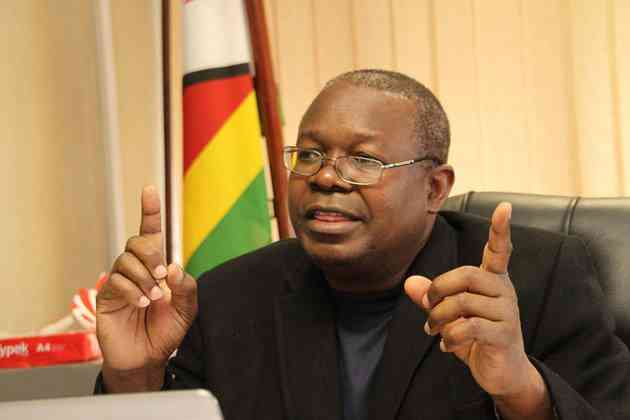
A Chinese tycoon and former intelligence official who is said to be held ‘incommunicado’ in his homeland allegedly helped Zimbabwe’s spy agency to set up a multi-million-dollar business network with interests in mining, agriculture, tourism and transportation to fund its activities, a new report has claimed.
Sam Pa, whose Hong Kong headquartered Queensway group has established a sprawling network of cash spinning assets across Africa, bankrolled the Central Intelligence Organisation (CIO), including extending US$50 million to establish a Zimbabwean footprint, according to a report released by The Sentry, a United States-based investigative group.
It named 12 companies: Terrestrial Holdings, Terrestrial Mining, Whitelime Mining, Chimanimani Logistics, Chapel Mining, Sino Zim Development, Sino Zim Cotton Holdings, Sino Zim Diamonds, Terrestrial Safaris, Rudgold Investments, Dashville Enterprises and Todware Investments as some of the businesses linked to the spy agency.
In the explosive report, The Sentry claimed Terrestrial Mining and Whitelime Mining recently clinched deals to mine coal in strategically located 50 000-hectare concessions close to Lake Kariba.
However, The Sentry said “a representative for both Terrestrial Holdings and Terrestrial Mining said that claims of CIO control or ownership were not true.”
Last week, The Sentry published another report in which the CIO’s deputy director Asher Walter Tapfumaneyi denied establishing shady offshore companies.
But the Sentry warned authorities against allowing the spy agency to tap into off budget funding.
The 15–page investigation titled ‘The CIO's Business Network’ said such funds were prone to abuse.
- Letter from America: Is former president Donald Trump a hero or villain?
- Zanu PF shutting down political space
- Parties condemn Afrophobic attacks in SA
- Top CIO boss up for extortion
Keep Reading
It claimed the CIO ventured into business during a power sharing administration between the late former strongman Robert Mugabe and his rival, former Prime Minister Morgan Tsvangirai between 2009 and 2013.
Tsvangirai died in 2018.
His Movement for Democratic Change controlled the Ministry of Finance and tightened the screws on extravagance under then Treasury boss Tendai Biti’s ‘we eat what we kill’ stance.
During a parliamentary hearing in 2018, former CIO director general Happyton Bonyongwe said businesses were established to “raise funding to supplement the meagre resources, which were coming out of the Ministry of Finance”, the report quoted him as saying.
It claimed Kusena, a diamond operation which exploited the resource in Marange, was also linked to the spy agency.
The Sentry alleged that during the five years to 2012, the CIO established Sino Zim Diamonds, Sino Zim Cotton, Sino Zim Resources and Sino Zim Development — “with a Chinese-Angolan entrepreneur known as Sam Pa.”
The deals easily established an empire of significant clout, tapping into logistics, property, tobacco and cotton.
The Sentry linked Sino Zim to another operation, Sino Zim Development Pte, which it alleged was registered in Singapore.
At one point, the firm poured US$50 million “in funding to its eponymous counterpart in Zimbabwe, and it also part-owned Sino Zim Diamond, registered in Hong Kong.”
It also claimed Sam Pa-linked businesses provided at least US$1 million and 100 pickup trucks to the CIO in the run-up to the 2013 elections “while Sam Pa himself was involved in diamond deals.”
“Sam Pa and several Sino Zim companies—Sino Zim Development, Sino Zimbabwe Cotton Holdings, and Sino Zimbabwe Holdings — were sanctioned by the United States for undermining democracy through their off-budget financing of the CIO,” the report claimed.
In China, authorities have allegedly held Sam Pa “incommunicado” since 2015 as part of a corruption investigation.
A Financial Times report said in 2014 that in Angola, the tycoon had also established a vast empire tapping into Luanda’s oil wells.
“Queensway group of companies have made themselves a partner of choice for the repressive regimes that control some of Africa’s most resource-rich states, where corruption traps millions in poverty while their rulers amass extraordinary wealth – from Robert Mugabe’s Zimbabwe and a murderous junta in Guinea to the corrupt petro-states of Angola and Nigeria.
“It is a strategy that this year earned Pa a place on a US sanctions list,” The Financial Times alleged in a report titled ‘How Sam Pa became Africa’s middleman’.
“Over the past decade, Pa has risen from obscurity to clinch deals across five continents worth tens of billions of dollars.
“He has helped to build from scratch a sprawling network of companies linked by common owners, directors and a registered address at 88 Queensway in Hong Kong.
“Those who have followed the network’s evolution have dubbed it the “Queensway group,” The Financial Times claimed.
Justifying its claim that the 12 companies had links with Zimbabwe’s spy agency; The Sentry said its probe led investigators to familiar faces.
“The Sentry was able to conclude that the CIO likely controls Terrestrial Holdings by following clues about a past network of CIO companies, which made it possible to draw up a list of company directors and identify an address, both linked to the spy agency,” it said.
It said Sino Zim companies linked companies included Mutyork Investments, Star Delight Holdings, and Double Fame Holdings, ‘failed to respond to requests for comment”.
“During the hearing on Kusena, Bonyongwe gave valuable clues — both deliberately and accidentally — about how the CIO structured its investments.
He described how Kusena’s board, chaired by (the late) businessman Jonathan Kadzura, had members “representing the (President’s) department” and how the board then reported upward to the CIO’s investment committee, headed by the agency’s deputy director-general.
These details were volunteered by Bonyongwe.
However, by leaving his speaking notes on show for the cameras, Bonyongwe also inadvertently revealed the name of the holding company through which the agency owned 10% of Kusena,” it added.
The Sentry said bigger financial muscle had given Tapfumaneyi, power to establish Forever Associates Zimbabwe (Faz), which was linked to voter intimidation in last year’s polls.
“Most recently, CIO-linked companies Terrestrial Mining and Whitelime Mining have been awarded coal mining concessions covering 50 000 hectares near Lake Kariba in western Zimbabwe, an area close to large proposed and existing coal-fired power plants,” The Sentry added.
A representative for both Terrestrial Holdings and Terrestrial Mining said that claims of CIO control or ownership were not true.
“The existence of an autonomous CIO business network matters because the agency—which has reportedly engaged in election-related intimidation—requires civilian control, including full financial oversight and transparency, to prevent abuse.
“Security forces with their own sources of revenue can more easily go rogue,” the report said.
“The CIO’s secret business interests might matter less if the organisation was a politically neutral and accountable intelligence agency, gathering information and defending against threats to Zimbabwe’s democratic constitution.
“This is far from the case.
“During the 2023 elections, the CIO reportedly intimidated opposition candidates, and its deputy director general helped establish Forever
Associates Zimbabwe, a Zanu PF affiliate criticised for intimidating rural voters—an allegation that both the spy boss and Faz deny.”
Several victims of political violence and threats identified CIO agents as the perpetrators, according to a joint report by Zimbabwean human rights watchdogs and police complaints reviewed by The Sentry.
National security organs require comprehensive oversight mechanisms to prevent abuse. International best practices compiled by the United Nations Human Rights Council state that “an effective system of intelligence oversight includes at least one civilian institution that is independent of both the intelligence services and the executive,” The Sentry report said.
“This oversight role should include “examining whether intelligence services make efficient and effective use of the public funds allocated to them.
“Civilian control of the security forces requires full financial control.
“Militaries and intelligence agencies with access to independent off- budget sources of income are more capable of setting their own agendas—without seeking funding or approval from elected civilian politicians.”






